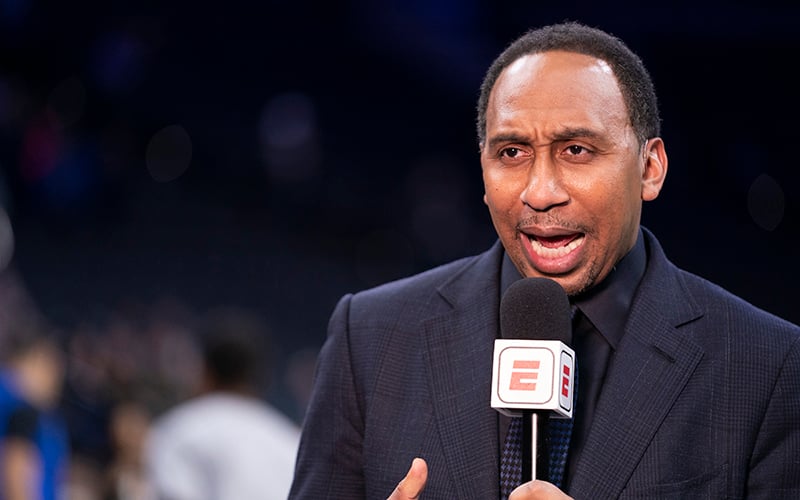
ESPN analyst Stephen A. Smith is an example of the opinionated personalities that have populated the sports broadcasting world. (Photo by Mitchell Leff/Getty Images)
PHOENIX – At a time when COVID-19 has stiff-armed sporting events, the television industry’s opinionated personalities are front and center.
After all, you don’t need competition to spout an opinion.
The changing landscape has shined a spotlight on television’s hierarchy: TV sports personalities like Stephen A. Smith and Skip Bayless yield multi-million dollar salaries for expressing their thoughts.
In fact, Smith’s five-year deal with ESPN officially crowned him as the company’s highest paid sportscaster. The New York Post reported in November that Smith’s deal is worth $40 million, while the four-year contract Bayless signed in 2016 was worth approximately $26 million, according to sports media journalist Richard Deitsch.
Why are these opinionated figures, whose commentary channels discussions in a sports bar, deemed to be so valuable?
Media critic Bill Goodykoontz of The Arizona Republic believes the answer to that question is hot takes.
“They stir the pot, and that’s that’s the job of any opinion writer or broadcaster,” Goodykoontz said. “The ones who are best at it have a pretty extensive reporting background, which means that they have good sources and they have good habits.”
Jim O’Donnell, a sports and media columnist for The Daily Herald in suburban Chicago, believes shows that include such rhetoric, like ESPN’s “First Take” and Fox Sports’ “Skip and Shannon: Undisputed”, should be avoided by viewers altogether.
“I think the level of all viewers available at the times the shows air is extraordinarily low and eminently worthy of how poor and redundant the programming is,” O’Donnell said in an email. “If I weren’t paid to periodically check in on that dreck, I wouldn’t go near it.”
O’Donnell also remains skeptical of the reported salaries for Smith and Bayless.
“Regarding (Smith’s) $6 million salary, I would fully believe it if I saw his tax returns,” O’Donnell said. “I will add that when Fox threw money at … Skip Bayless, it had to result in an increase for Smith from Disney ESPN. Bayless’s reported $5 million is also another number I would like to see confirmed by tax returns and other documentation.”
Regardless of the skepticism of each figure’s reported earnings, Goodykoontz does not believe anybody in the space, let alone Smith, deserves to be paid the massive salary he has on his contract.
“Nothing is going to justify Stephen A. Smith’s salary,” Goodykoontz said. “What you also have to remember is that these audiences wax and wane and the person that’s really hot right now, they’re going to throw a lot of money at.”
Regardless of the massive salaries, it raises the question: What makes an industry figure like Smith so popular?
O’Donnell believes a large part of Smith’s appeal can be attributed to his showmanship.
“His theatricality does set him apart from the braying herd,” O’Donnell said. “But he generally prattles on about subjects he has little first-hand knowledge of.
“Put him near one of his power alleys (the Knicks, the NBA), and he gets better,” O’Donnell said. “Put him farther away and he has to rely on a vacuous thespianship, which I find must-flee TV.”
Award winning columnist William C. Rhoden, a visiting professor at Arizona State’s Walter Cronkite School of Journalism and Mass Communication, disagrees. He believes Smith carries established legitimacy in the world of sports journalism.
“Stephen A. Smith has been doing this for a long time. He does have sources, he’s paid to have hot takes,” Rhoden said. “I think Stephen A. Smith, as you peel back the surface stuff, and sometimes he’s screaming and all that, is fundamentally sound because he does have sources, people call him, and he’s also a print person.”
Smith spent many years early in his career as a newspaper journalist, with stops at the Winston-Salem Journal, the Greensboro News and Record and the New York Daily News
SUNY Oswego journalism professor Brian Moritz believes Smith’s appeal comes from relatability.
“He’s outspoken and kind of unabashedly a fan,” Mortiz said. “I think that young people, younger sports fans can really relate to that.”
Regardless of whether their audience members agree or disagree, the Stephen A. Smiths and the Skip Baylesses of the world stir the pot, evoke reaction, and most importantly, keep the eyes of the viewer glued to the television as they wait to see what they’ll say next.
